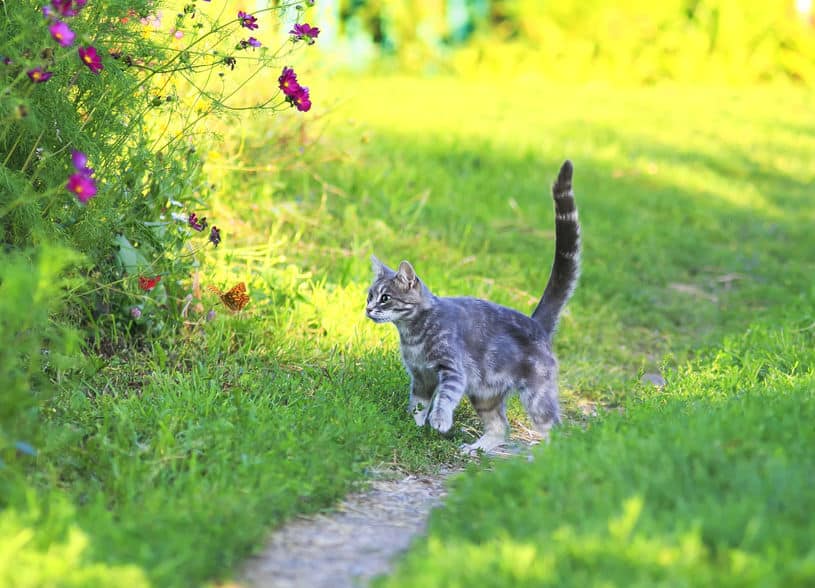You may have seen your cat chasing a wasp and wondered what the risks are.
Wasps can harm cats in the same way that they can hurt humans. Cats are only really at risk if stung multiple times, or if they have an allergic response, which is rare. A cat’s propensity to chase and swat at insects could increase its chance of being stung.
Let’s take a closer look at interaction between cats and wasps.
Just as with humans, the odd sting is unlikely to harm a cat, unless they have an allergic reaction. You can check out this advice here for what to do if you think a cat may be suffering an allergic response to a sting.
Common symptoms that may indicate a sting to a cat may be of concern include difficulty in breathing, vomiting, and excessive swelling that gets worse over time. In these situations, an emergency vet should be contacted. In most cases, as with humans, a sting can cause localized swelling, that will ease within a few hours.

Will cats attack wasps?
As with other insects, cats will be attracted by the movement of wasps and very likely will be drawn to them. Despite the ability for wasps to sting this does not seem to necessarily put a cat off from chasing them. Cats seem to have an instinct response to chasing insects that they enjoy. It may be that in a wild setting this desire is fulfilled by hunting for mice and other food sources, but in captivity, this hunting drive is pent up and the insects provide an outlet.
Will cats try to eat wasps?
Despite not being a primary food for cats they have been observed to eat insects. Often they may not actually ingest an insect such as a wasp but may chew it.
If a cat does kill and eat a wasp then it is possible for it still to be stung, even if the wasp is dead. Wasps withdraw and retract their stingers. When dying it is common for wasps to extend their stinger, especially if the cause of death was by the cat. With the stinger extended it is possible that it could catch and dispense a residue of venom. The risk is quite minimal, however, and the dose of venom would be minimal also.
Will wasps attack a cat?
Wasps have no interest in attacking a cat unless as a form of self-defense. It is possible that a wasp could become aggressive if a cat gets too close to a nest. If a wasp nest is detected in or around the home then having it removed is an important precaution. Wasps can sting multiple times and can be dangerous if a group response is caused. See this article about wasp stings
Will wasps be attracted to cat food?
Cat food left outside could attract wasps. Wasps during the spring and summer will opportunistically take sources of meat to feed to developing larvae in their nest. By the end of the fall, they will no longer be seeking meat as the larvae will have fully developed. Just as with humans if the cat swats at a wasp when it is scavenging then the wasp may well sting. See this article about wasps’ attraction to meat.
